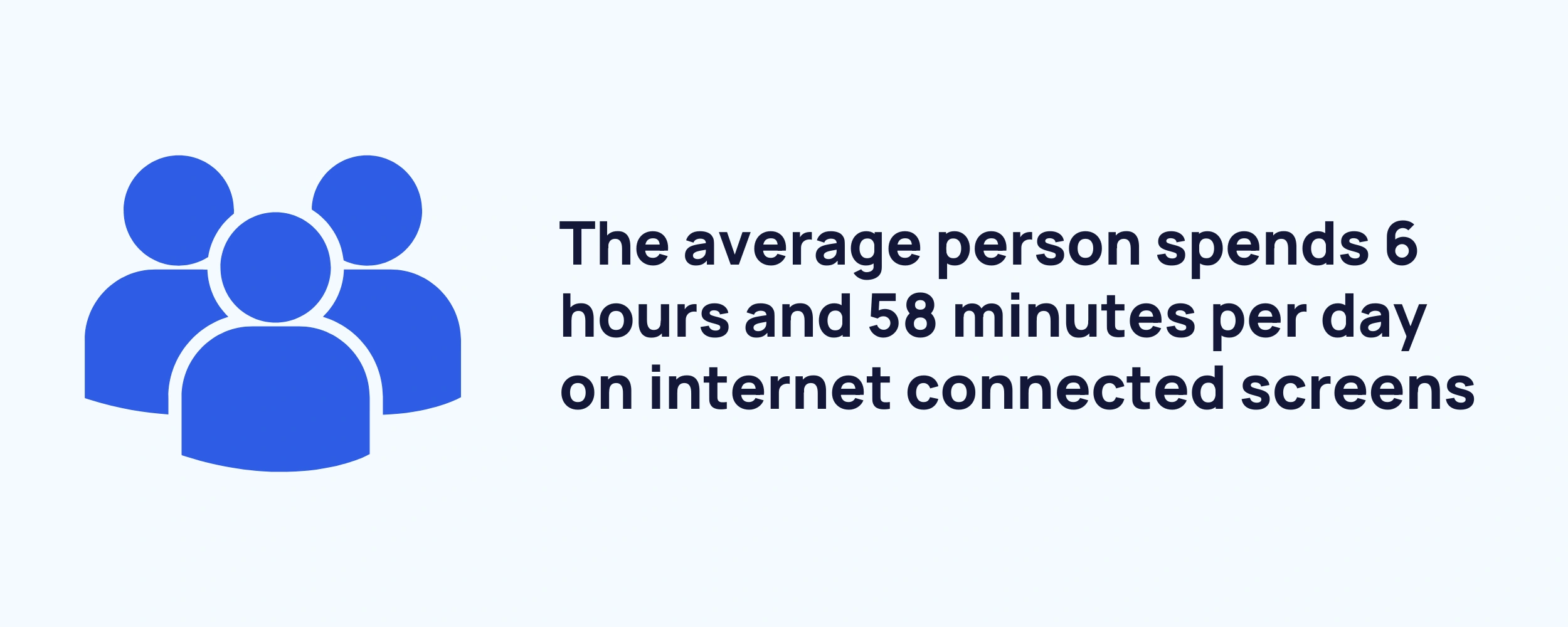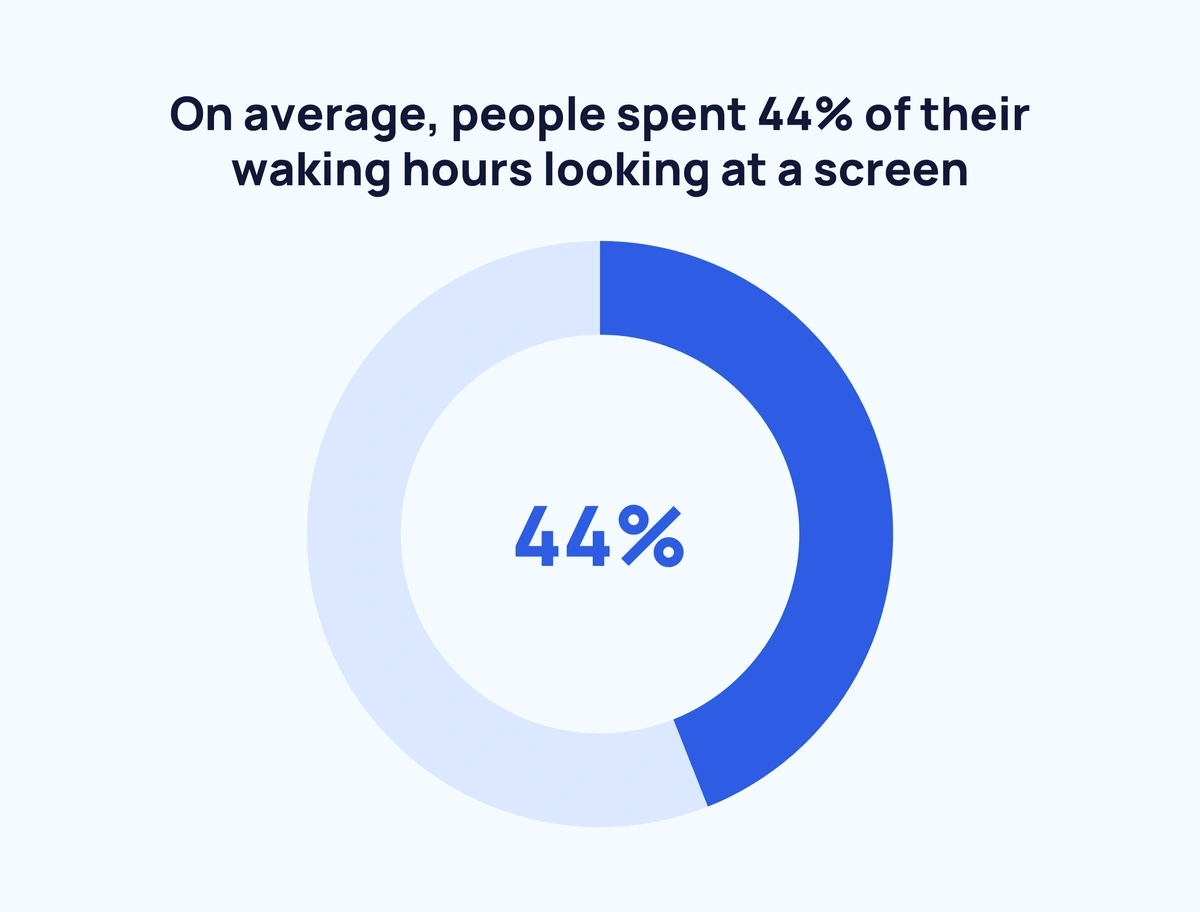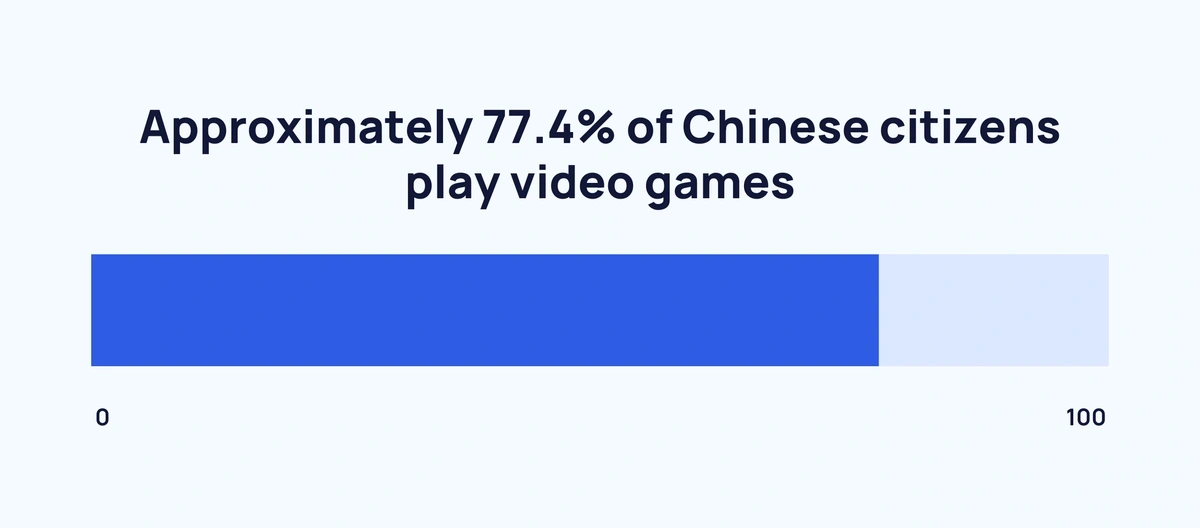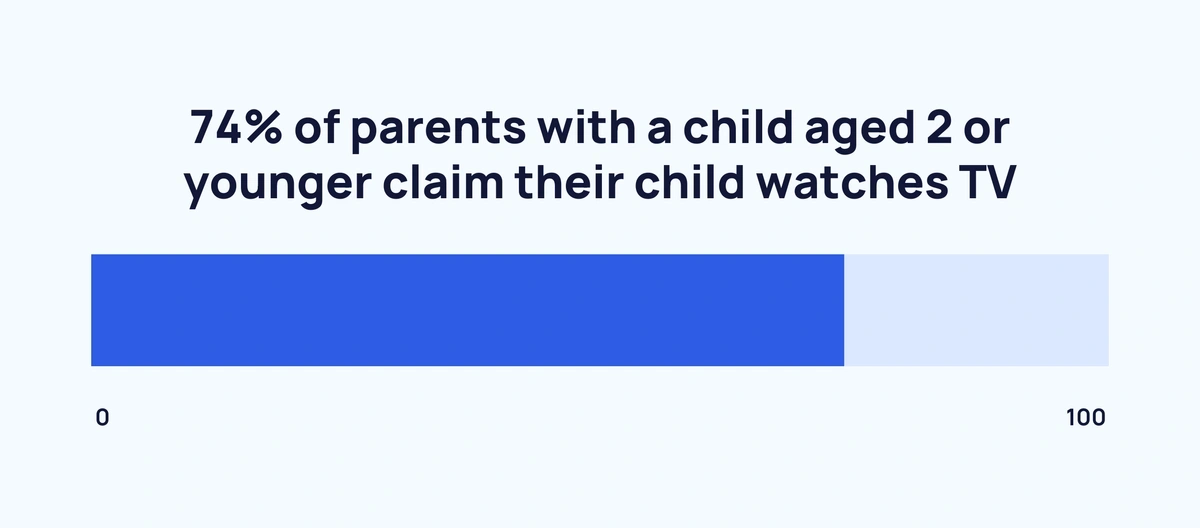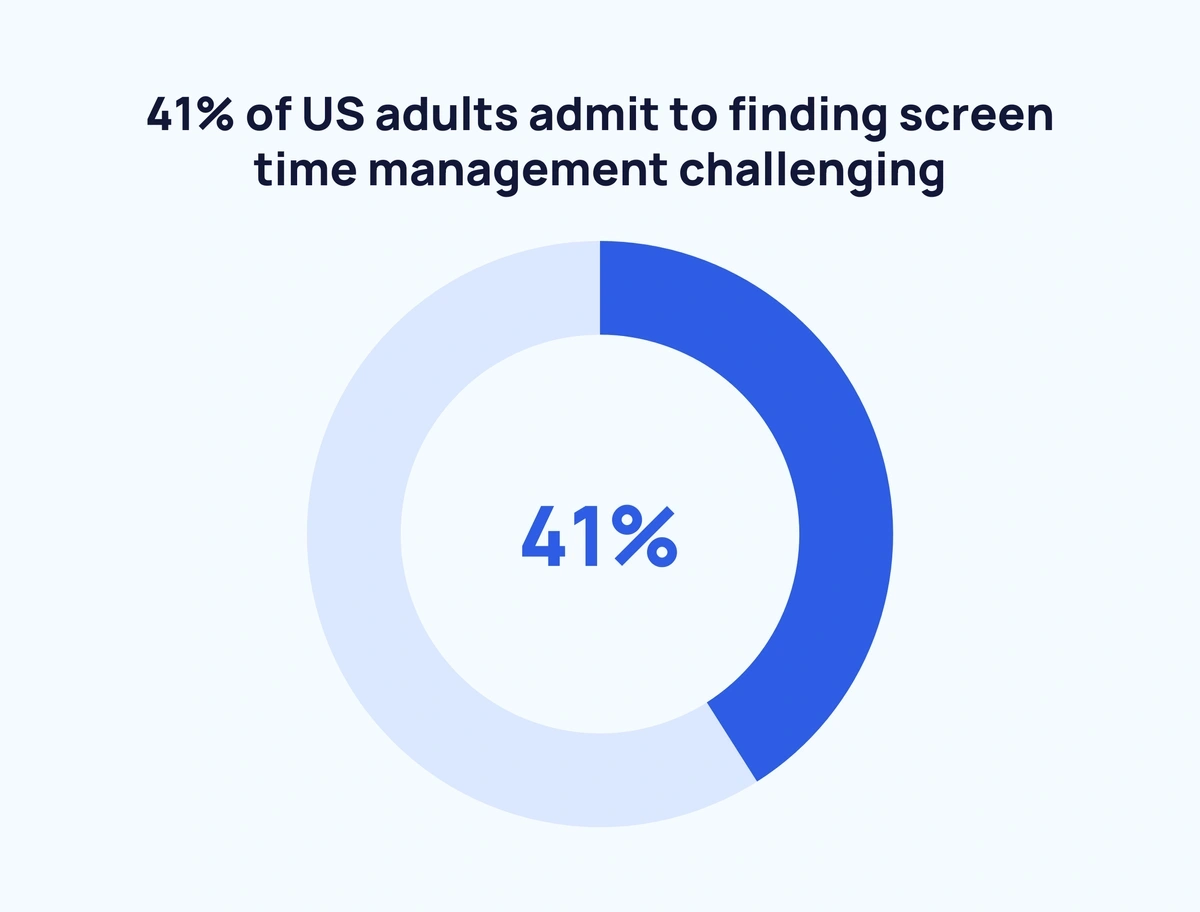Screen time has become a part of everyday life for most people.
And many don't realize how much time they spend on phone screens, computer screens and TV screens.
With that in mind, we examine the latest screen time data to reveal insights focused on these areas:
- Average screen time statistics 2024
- Average screen time overview
- Average screen time in the US
- Screen time changes over time
- Average screen time by region
- Screen time by age
- Impact of screen time
Average screen time statistics 2024
- Globally, people are average6 hours and 58 minutesscreen time per day.
- Daily screen time has almost increased50 minutes per daysince 2013.
- The average American spends7 hours and 4 minuteslooking at a screen every day.
- South Africans use10 hours and 46 minuteson the screen during the day.
- Almost half (49%)of 0 to 2 year olds communicate with smartphones.
- Gen Z averagearound 9 o'clockvan screen time per day.
Average screen time overview
According to the most recent data available, the average person uses6 hours and 58 minutesper day on screens connected to the internet.
It is a1% (4 minutes)increase over the 2021 figure – equivalent to more than 5 billion days, extrapolated to all internet users worldwide.
Overall, daily screen time has increased13% (49 minutes)since 2013.
Here's a look at the average screen time with an internet connection since 2013:
| Year | Average screen time | Change from last year |
| 3e kwartaal 2013 | 6 hours 9 minutes | - |
| 3e kwartaal 2014 | 6 hours 23 minutes | ↑ 3,8 % |
| 3e kwartaal 2015 | 6 hours 20 minutes | ↓ 0,8 % |
| 3e kwartaal 2016 | 6 hours 29 minutes | ↑ 2,4% |
| 3e kwartaal 2017 | 6 hours 46 minutes | ↑ 4,4% |
| 3e kwartaal 2018 | 6 hours 48 minutes | ↑ 0,5% |
| 3e kwartaal 2019 | 6 hours 38 minutes | ↓ 2,5 % |
| 3e kwartaal 2020 | 6 hours 54 minutes | ↑ 4% |
| 3e kwartaal 2021 | 6 hours 58 minutes | ↑ 1% |
Recent figures suggest that the average person spends more than €40%of their waking hours on an internet-connected screen.
And considering the 30% jump in mobile screen time in 2019(2 hours 56 minutes)and the years 2021(4 hours 12 minutes)global screen time averages are likely to continue to grow.
Bron: Datarapportering,Datarapportering,Digital Information World
Average screen time in the US
The average screen time in the US is7 hours 4 minutesper day - 7 minutes more than the global average according to Comparitech data.
The split between mobile and computer screen time is almost even in the US. Average,3 hours and 30 minutesis dedicated to mobile devices, while3 hours and 34 minutesused on computers.
Here's a comparison between US and global screen time allocation:
| Land | Andel streaming tv | Share in playing video games | Daily time spent playing video games | Daily time spent on social media |
| Operating system | 91,6% | 80,9 % | 1 time 27 min | 2 hours 14 minutes |
| Global average | 93,5% | 83,6% | 1 time 12 min | 2 hours 27 minutes |
Somewhat surprisingly, the US lags behind the world average when it comes to the share of the population that streams TV(-1,9%)and the share of the population that plays video games(-2,7%).
The daily time spent on video games is15 minutesabove average. But the time spent on social media is13 minuteslower than the global average.
Age clearly plays an important role in American teens' screen time consumptionmore than 3 hours a daywatching TV or videos.
Here's the full breakdown of how the average American teen schedules their daily screen time:
| Activity | Average daily screen time |
| Watch TV/video | 3 hours 16 minutes |
| Game | 1 time 46 min |
| Social media | 1 time 27 min |
| Browse websites | 51 minutes |
| Other things | 29 min |
| video chatting | 20 minutes |
| E-reading | 15 minutes |
| Content creation | 14 minutes |
And looking more closely at this demographic, income also plays a notable role in screen time consumption.
U.S. teens from lower-income households (<$35,000 annual household income) use9 hours and 19 minuteson their screen every day.
It is2 hours and 3 minutes leftthan that7 hours and 16 minutesthe average of teens from higher income households ($100,000+ annual household income).
Sources: Comparable,Common sense media
Screen time changes over time
From phones to tablets and smartwatches to TVs, screens are everywhere.
The vast majority are connected to the internet today. And the average time we spend using the internet through our screens is increasing.
However, the rate at which time increases is not the same across the board. And some countries have even seen a decline between 2021 and 2022.
Here is the percentage change between average screen time in 2021 and 2022 for selected countries:
| Land | Change in screen time |
| United Arab Emirates | ↑ 1.12 |
| Turkey | ↑ 0,44 |
| If | ↑ 0,42 |
| South Africa | ↑ 0,39 |
| Portugal | ↑ 0,37 |
| Egypt | ↑ 0,26 |
| Saudi Arabic | ↑ 0,21 |
| Thailand | ↑ 0,21 |
| Canada | ↑ 0,19 |
| Belgium | ↑ 0,16 |
| Brazil | ↑ 0,11 |
| Sweden | ↑ 0,06 |
| Switzerland | ↑ 0,04 |
| Ireland | ↑ 0,01 |
| Japan | ↑ 0,01 |
| Australia | - 0 |
| Taiwan | - 0 |
| Argentina | ↓ 0,01 |
| Israel | ↓ 0,02 |
| Russia | ↓ 0,02 |
| Austria | ↓ 0,04 |
| Colombia | ↓ 0,04 |
| Poland | ↓ 0,04 |
| Germany | ↓ 0,05 |
| Depth | ↓ 0,06 |
| Mexico | ↓ 0,06 |
| Malaysia | ↓ 0,07 |
| Spain | ↓ 0,07 |
| The United States of America | ↓ 0,07 |
| South Korea | ↓ 0,08 |
| Vietnam | ↓ 0,09 |
| France | ↓ 0,12 |
| Italy | ↓ 0,12 |
| Denmark | ↓ 0,13 |
| The United Kingdom | ↓ 0,13 |
| Indonesia | ↓ 0,15 |
| New Zealand | ↓ 0,17 |
| Romania | ↓ 0,17 |
| Holland | ↓ 0,18 |
| Hongkong | ↓ 0,29 |
| Philippines | ↓ 0,29 |
| Singapore | ↓ 0,38 |
Bron: Comparable
Average screen time by region
Screen time varies significantly by region. According to recent data from 43 countries, South Africa tops the charts for average screen time per person. day.
The Philippines, Brazil and Colombia are each average10+ hours per dayAlso.
Here's a closer look at 20 of the most active screen time users:
Land | Total screen time | Mobile screen time | % | Computer screen time | % |
South Africa | 10 hours 46 minutes | 5 hours 9 minutes | 48% | 5 hours 37 minutes | 52% |
Philippines | 10 hours 27 minutes | 5 hours 47 minutes | 55% | 4 hours 40 minutes | 45% |
Brazil | 10 hours 19 minutes | 5 hours 25 minutes | 53% | 4 hours 54 minutes | 47% |
Colombia | 10 hours 3 minutes | 5 hours 9 minutes | 51% | 4 hours 54 minutes | 49% |
Argentina | 9 hours 38 minutes | 5 hours 4 minutes | 53% | 4 hours 34 minutes | 47% |
Malaysia | 9 hours 10 minutes | 4 hours 49 minutes | 53% | 4 hours 21 minutes | 47% |
Thailand | 9 hours 6 minutes | 5 hours 28 minutes | 60% | 3 hours 38 minutes | 40% |
Mexico | 8 hours 55 minutes | 4 hours 37 minutes | 52% | 4 hours 18 minutes | 48% |
Indonesia | 8 hours 37 minutes | 4 hours 56 minutes | 57% | 3 hours 41 minutes | 43% |
FEET | 8 hours 36 minutes | 4 hours 35 minutes | 53% | 4 hours 1 min | 47% |
Taiwan | 8 hours 7 minutes | 4 hours 12 minutes | 52% | 3 hours 55 minutes | 48% |
Saudi Arabic | 8 hours 5 minutes | 4 hours 35 minutes | 56% | 3 hours 30 minutes | 44% |
Egypt | 8 hours 2 minutes | 4 hours 25 minutes | 55% | 3 hours 37 minutes | 45% |
Turkey | 8 timer | 4 hours 16 minutes | 53% | 3 hours 44 minutes | 47% |
Portugal | 7 hours 56 minutes | 3 hours 34 minutes | 45% | 4 hours 22 minutes | 55% |
Russia | 7 hours 50 mins | 3 hours 39 minutes | 47% | 4 hours 11 minutes | 53% |
Israel | 7 hours 35 minutes | 3 hours 31 minutes | 46% | 4 hours 4 minutes | 54% |
Singapore | 7 hours 28 minutes | 3 hours 38 minutes | 49% | 3 hours 50 minutes | 51% |
If | 7 hours 18 minutes | 4 hours 5 minutes | 56% | 3 hours 13 minutes | 44% |
Global average | 6 hours 57 minutes | 3 hours 43 minutes | 53% | 3 hours 14 minutes | 47% |
On average people used44%of their waking hours looking at a screen.
But in South Africa this number is closer70%.
While this share is much lower in Japan28%.
As the table above shows, screen time on mobile devices and computers is fairly evenly distributed. In fact, the five biggest discrepancies each come from Asia:
- Thailand -20%difference in favor of mobile screen time
- Indonesia -14%difference in favor of mobile screen time
- If -12%difference in favor of mobile screen time
- Saudi Arabic -12%difference in favor of mobile screen time
The biggest difference in favor of computer screen time can be found in Portugal:10%.
Screen time on social media and screen time on gaming consoles are increasing worldwide. But viewing time for more traditional TV (including streaming) is decreasing.
Below are figures for the global average screen time allocation per day:
| Screen time allocation | 3e kwartaal 2020 | 3e kwartaal 2021 | 2020-2021 Change |
| Use of internet | 6 hours 54 minutes | 6 hours 58 minutes | ↑ 1% (4 minutes) |
| Watching TV (incl. streaming) | 3 hours 24 minutes | 3 hours 20 minutes | ↓ 2% (4 minutes) |
| Use of social media | 2 hours 25 minutes | 2 hours 27 minutes | ↑ 1.4% (2 minutes) |
| Using a gaming console | 1 time 11 min | 1 time 12 min | ↑ 1,4 % (1 min.) |
And here's how the above countries compare in terms of each screen time allocation:
| Land | Andel streaming tv | Share in playing video games | Daily time spent playing video games | Daily time spent on social media |
| South Africa | 96,6% | 90,2% | 1 time 3 min | 3 hours 43 minutes |
| Philippines | 98,3% | 96,4% | 1 time 34 min | 4 hours 6 minutes |
| Brazil | 97,7% | 89,3% | 1 time 10 min | 3 hours 41 minutes |
| Colombia | 95,5 % | 86,9 % | 1 time 6 min | 3 hours 46 minutes |
| Argentina | 96,7% | 86,6% | 1 time 1 min | 3 hours 26 minutes |
| Malaysia | 95,5 % | 90,1% | 1 time 13 min | 3 hours 2 minutes |
| Thailand | 97,1% | 94,7% | 1 time 58 min | 2 hours 59 minutes |
| Mexico | 97,9% | 91,2% | 1 time 31 minutes | 3 hours 20 minutes |
| Indonesia | 97,1% | 94,5% | 1 time 19 min | 3 hours 17 minutes |
| FEET | 93,9 % | 90,3% | 1 time 29 min | 3 hours 4 minutes |
| Taiwan | 94,8% | 91,6% | 53 minutes | 2 hours 4 minutes |
| Saudi Arabic | 95,9 % | 91,4% | 1 time 53 min | 3 hours 24 minutes |
| Egypt | 91,2% | 86,3% | 2 hours 3 minutes | 3 hours 13 minutes |
| Turkey | 96,4% | 91,5% | 1 time 6 min | 2 hours 59 minutes |
| Portugal | 84,7% | 81,2% | 38 minutes | 2 hours 28 minutes |
| Russia | 84,5% | 78,6% | 30 minutes | 2 hours 27 minutes |
| Israel | 95,7% | 75,2% | 19 minutes | 1 time 58 min |
| Singapore | 91,5% | 84,5% | 1 time 11 min | 2 hours 31 minutes |
| If | 97,2% | 92% | 1 time 21 min | 2 hours 36 minutes |
| Global average | 93,5% | 83,6% | 1 time 12 min | 2 hours 27 minutes |
About 4 in 5 Chinese citizens play video games -6,2%below the global average.
And average1 hour and 15 minutesis used on game consoles - just3 minutesmeans all over the world.
Nevertheless, the Chinese government wants to crack down on children's screen time by limiting their playtime tothree hoursWeekly. This corresponds to almost 26 minutes per day.
Based on available data, Japan and Russia come closest to this figure on average(30 minutes). And only Israel has a lower average(19 minutes).
Sources: Comparable,Data report,Reuters
Screen time by age
Age is an important factor in screen time consumption. All around3 out of 4 (74%)of parents with a child aged 2 years or younger claim that their child watches television.
In90%of older children are looking at a TV screen.
Here's a look at the percentage of kids using certain devices according to the latest research:
| The | TV | Tablet | Smartphone | Desktop/laptop | Game |
| 0-2 years | 74% | 35% | 49% | 12% | 9% |
| 3-4 years | 90% | 64% | 62% | 21% | 25% |
| 5-8 years | 93% | 81% | 59% | 54% | 58% |
| 9-11 years | 91% | 78% | 67% | 73% | 68% |
| Total | 88% | 67% | 60% | 44% | 44% |
Almost across the board, there is a strong positive correlation between age and the proportion of children using a device.
Interestingly, the most passive screen time experience (watching TV) increased from age 3 to 4.
While more active and potentially demanding devices (desktops/laptops and gaming consoles) steadily increase with age.
It is perhaps not surprising that young people spend more time in front of screens than average. A recent survey found that Generation Z is spending moneyabout 9 hours per daylooking at a screen - approx2 more hoursthan the US and global average.
Bron: PewResearch,Forbes
Impact of screen time
Data from a survey of more than 2,000 American adults shows that less than half of the time spent on screens is considered productive.
Moreover,41%admit that managing screen time is a challenge.
And a concern21%feel guilty about the amount of time their children spend in front of screens.
Excessive screen time can have very real consequences, especially in children.
Primary school children who watch more than 2 hours of screen time per day are more likely to have social, emotional and attention problems.
On a more positive note, dozens of studies have shown that there is no significant correlation between screen time and academic performance.
But a wide range of harmful side effects are associated with too much screen time, including:
- Lack of sleep – Blue light disrupts melatonin production and disrupts the body's circadian rhythm.
- Obesity – Data shows a strong link between screen time and obesity in children aged 5 to 17, most likely due to the sedentary nature of screen viewing.
- Susceptibility to type 2 diabetes - In Britain, children aged 9 to 10 who spent more than 3 hours on screen every day were more likely to show resistance to insulin
- Delayed Learning - Young children who watch an excessive amount of television may have difficulty understanding language.
In the broader population, limiting social media use to a maximum of 30 minutes per day has been associated with reduced depression and improved well-being.
Sources: People,AIFS,Mayo Clinical Health System,The journalist's source,Active health,Quartz
Conclusion
Screens are inextricably linked to modern life. And the way people spend their screen time is constantly evolving.
Whether the amount of time people spend on screens increases or there is a sudden reversal remains to be seen.
If you liked these stats, check out some of our other related content:Surprising statistics about social media addiction,Trending social media startup, InGlobal daily use of social media.
